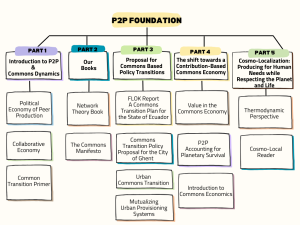User:MDEE/Test: Difference between revisions
No edit summary |
No edit summary |
||
| Line 20: | Line 20: | ||
'''Keywords:''' #CollaborativeEconomy #PeerProduction #OpenInnovation #CommonsEconomics | '''Keywords:''' #CollaborativeEconomy #PeerProduction #OpenInnovation #CommonsEconomics | ||
'''3.[[Commons Transition Primer]]'''. ''Bauwens, M.et al. (2017). Commons Transition and P2P: A Primer. Transnational Institute (TNI) and P2P Foundation.'' [https://www.tni.org/files/publication-downloads/commons_transition_and_p2p_primer_v9.pdf '''PDF'''] | |||
In this simplified and illustrated presentation, we summarize the principles and practices of the commons, especially as to how it affects the state and market. The work presents a pioneering transition program that outlines this transformation in political and policy terms, based on the experiences of the P2P Foundation advising the Ecuadorian government, and the city of Ghent. | |||
'''Keywords:''' #CommonsTransition #P2PEconomy #SocialGovernance #OpenCooperativism | |||
*Our book: Bauwens, M., Kostakis, V., & Pazaitis, A. (2019). '''[[Peer to Peer: The Commons Manifesto (Book)]]''', London: Westminster University Press. | *Our book: Bauwens, M., Kostakis, V., & Pazaitis, A. (2019). '''[[Peer to Peer: The Commons Manifesto (Book)]]''', London: Westminster University Press. | ||
Revision as of 10:33, 22 November 2024
Test Page images

I. Introduction to P2P and Commons Dynamics
1.Political Economy of Peer Production. Bauwens, M. (2005). The Political Economy of Peer Production. CTheory. PDF
This is the foundational text that offers the definition and first analysis of the meaning of the emergence of peer production, and what it means for our human society and productive capacity. Peer production is essentially about ‘trans-local’ self-organization, a new capacity of humanity to coordinate voluntary work at a global scale. We ask the question of how this new capacity relates to the institutions and practices of the market, capitalism, and the state.
Keywords: #PeerProduction #CollaborativeEconomy #CommonsTheory #DecentralizedGovernance
2.Synthetic Overview of the Collaborative Economy. Bauwens, M.et al. (2012). Synthetic Overview of the Collaborative Economy. P2P Foundation & Orange Labs. PDF
In this report we explore the full set of collaborative economic practices that co-emerged with the internet and the web,, such as: commons-based peer production (Yochai Benkler), wikinomics (Don Tapscott), crowdsourcing (Jeff Howe), open innovation (Henry Chesbrough), and collaborative consumption (Rachel Botsman). We ask: how do these new horizontal practices impact hierarchical corporations and the global economy.
Keywords: #CollaborativeEconomy #PeerProduction #OpenInnovation #CommonsEconomics
3.Commons Transition Primer. Bauwens, M.et al. (2017). Commons Transition and P2P: A Primer. Transnational Institute (TNI) and P2P Foundation. PDF
In this simplified and illustrated presentation, we summarize the principles and practices of the commons, especially as to how it affects the state and market. The work presents a pioneering transition program that outlines this transformation in political and policy terms, based on the experiences of the P2P Foundation advising the Ecuadorian government, and the city of Ghent.
Keywords: #CommonsTransition #P2PEconomy #SocialGovernance #OpenCooperativism
- Our book: Bauwens, M., Kostakis, V., & Pazaitis, A. (2019). Peer to Peer: The Commons Manifesto (Book), London: Westminster University Press.
Available as free e-book & low-cost paperback at: https://www.uwestminsterpress.co.uk/site/books/10.16997/book33
- Introduction to the Commons Transition.
Why We Need a New Kind of Open Cooperativism for the P2P Age
From the Communism of Capital to a Capital for the Commons
Recent Reports:
- Introduction to Commons Economics, By Michel Bauwens and Rok Kranjc [1].
- P2P Accounting for Planetary Survival: Towards a P2P Infrastructure for a Socially Just Circular Society. By Michel Bauwens and Alex Pazaitis. Foreword by Kate Raworth. P2P Foundation, June 2019. [2]
- On market-commons institutional design: Value in the Commons Economy: Developments in Open and Contributory Value Accounting. By Michel Bauwens and Vasilis Niaros. Heinrich Boll Foundation, 2016 [3]
- On staying within the carrying capacity of the earth: The Thermodynamics of Peer Production: How mutualization through commons can bring our matter/energy footprint down in dramatic ways
Policy Reports:
- On public-commons institutional collaboration at the city level: The Commons Transition Plan for the City of Ghent. Update: Mutualizing Urban Provisioning Systems, By Michel Bauwens and Rok Kranjc
- National knowledge commons at the state level: Full text of the research plan and project for the Ecuadorian government in 2014: Commons Transition Plan (FLOK version)
- Trans-local and Trans-national institutions, still missing in our repertoire, but we are working on it! See: Michel Bauwens and Robert Conan Ryan on Developing Autonomous Commons Magisteria